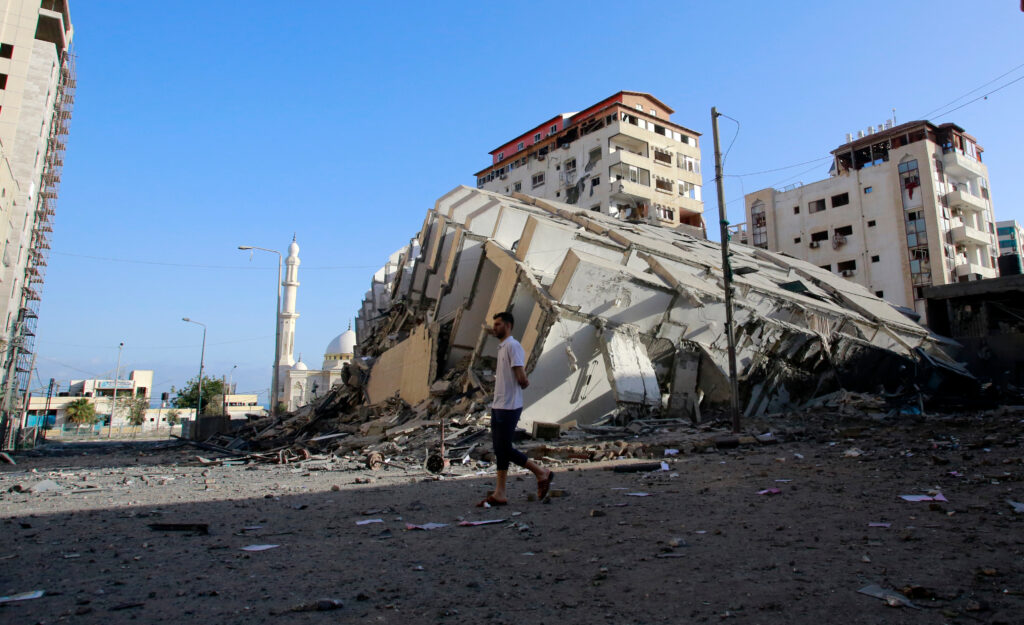Australia/Israel Review
A plan for Gaza
Mar 28, 2024 | Elliott Abrams, John Hannah, Lewis Libby

What is next for Gaza? With or without a hostage deal, the best hope for peace depends on continuing along the path endorsed by US President Biden after Hamas’ October 7 attack: Destroy Hamas’ military and governance capabilities; prevent its ability to threaten Israel again; and deal a defeat to Iran’s “axis of resistance”.
Such hopes won’t be realised by military means alone. As evidenced by the Feb. 29 aid convoy stampede that saw scores of desperate Palestinians die, what’s required is a simultaneous effort to address Gaza’s humanitarian crisis and vacuum of order arising in the war’s wake. Left unattended, a descent into anarchy will worsen Gazan despair, deepen Israel’s isolation, and benefit Iran and Hamas.
After multiple trips to the Middle East and nearly 100 expert interviews, we and a group of former US national security officials who worked for presidents of both parties believe the most realistic option is to create a private International Trust for Gaza Relief and Reconstruction.
The Trust would be established as an independent entity dedicated to building a peaceful post-Hamas Gaza. In effect, it would act as a super-NGO. This mechanism would offer key states, particularly in the Arab world, a less politically charged means of immediately aiding Gazans without directly putting their own prestige, diplomats or forces on the line in a high-risk environment where Israeli forces will remain active for months to come.
With US participation, the Trust ideally would be led by friendly Arab states like Saudi Arabia, Egypt and the United Arab Emirates with the greatest legitimacy, resources and interests to build a better future for Gaza. The Trust would work with all those willing to contribute to its mission, including other donor states, partner NGOs and international bodies like competent United Nations agencies.
The Trust’s first priority would be to mobilise large-scale emergency relief, including food, water, medical care and rapid construction of prefabricated housing communities that could serve as humanitarian islands of stability.
These efforts could start in areas of northern and central Gaza where Hamas control is already unravelling. As the immediate humanitarian crisis is stabilised, the Trust would help Gazans restore essential services, repair critical infrastructure, launch economic reconstruction, and generate responsible new leadership and police.
These initiatives should include deradicalisation programs for Gaza’s media, schools and mosques that draw on the success of similar efforts in the Emirates and Saudi Arabia.
The Trust should include an advisory council of closely vetted local Gazans as well as Gazans from the West Bank and diaspora with relevant administrative, security and professional experience, and the best knowledge of Gazan society.
If such forces prove insufficient, the Trust should consider another option: hiring professional security contractors (PSC) with good reputations among Western militaries to undertake limited missions like preventing the looting of aid supplies. Lessons learned from other conflicts have shown that with strict accountability regimes in place, PSCs are able to play valuable and effective roles.
Ultimately, the Trust would be an interim mechanism, focused on immediate humanitarian and governance priorities. As an Arab-led initiative, it would have unique credibility – both internationally and among Palestinians – to build a better future for Gaza and begin restoring it as a key component in an agreed-upon political horizon for Israel-Palestinian peace.
The Trust has clear advantages over the most frequently discussed alternatives for Gaza’s “day after”.
Israel is a non-starter. It lacks the will, resources and above all legitimacy with Gazans to rebuild Gaza.
The Palestinian Authority has enormous trouble running the West Bank. It has no chance today of effectively addressing the much larger problem of Gaza. Its most useful contribution would be blessing the Trust’s efforts and undertaking the major reforms required to make it a suitable candidate for governing a future Palestinian state.
As for the UN, what more is there to say than “UNRWA”? The UN’s lead agency for assisting Palestinians has been fatally compromised by mounting evidence that Hamas systematically infiltrated its operations in Gaza, including employees who participated in the October 7 massacres.
Friendly Arab states appear reticent to deploy their own national forces to Gaza and rightly so. It would quickly expose them to charges of doing Israel’s bidding and could also lead to disastrous clashes with Israeli troops. Hamas and Iran would work hard to exacerbate such frictions, just as they would if Americans were deployed.
Weighed against the alternatives, the Trust offers a more realistic path to address Gaza’s immediate crisis. It could also resurrect a degree of Israeli cooperation with its Arab neighbours that can jumpstart US-led efforts for creating a political horizon and countering the growing threat from Iran’s “axis of resistance”.
John Hannah is a senior fellow at the Jewish Institute for National Security of America (JINSA) and previously served in senior foreign policy positions for both Democratic and Republican US administrations. Elliott Abrams is the chairman of The Vandenberg Coalition and a senior fellow at the Council on Foreign Relations. Lewis Libby served in senior positions at the White House, Pentagon, and State Department. The authors are members of the Gaza Futures Task Force, a joint project of the Jewish Institute for National Security of America (JINSA) and The Vandenberg Coalition. Originally published on Fox News. © JINSA (www.JINSA.org), reprinted by permission, all rights reserved.
Tags: Gaza, Israel, Middle East, Palestinians






